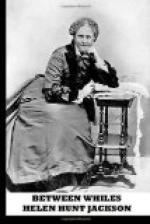“Thou art far handsomer than thy mother ever was,” he had said to her one morning soon after her arrival.
“Oh, didst thou know my mother, then, when she was young?” cried Victorine. “She is not handsome now, though she is newly wed; when she came to see me in the convent, I thought her very ugly. When didst thou know her, Benoit?”
Benoit was very red in the face, and began to toss straw vigorously as he looked away from Victorine and answered: “It was but once that I had sight of her, when Master Jean brought her here after they were married. Thou dost not favor her in the least. Thou art like Master Jean.”
“And the saints know that that last is the holy truth, whatever the rest may be,” thought Benoit, as he bustled about the courtyard.
“But thy tongue is the tongue of an imbecile,” said Victor, following him into the stable.
“Ay, that it is, sir,” replied Benoit, humbly. “I had like to have bitten it off before I had finished speaking; but no harm came.”
“Not this time,” replied Victor; “but the next thou might not be so well let off. The girl has a sharper wit than she shows ordinarily. She hath learned too well the ways of convents. I trust her not wholly, Benoit. Keep thy eyes open, Benoit. We’ll not have her go the ways of her mother if it can be helped.” And the worldly and immoral old grandfather turned on his heel with a wicked laugh.
Benoit had never seen young Willan Blaycke, but he knew him at his first glance.
“The son!” he muttered under his breath, as he saw him alight. “Is he to be lodged here? I doubt.” And Benoit looked about for Victor, who was nowhere to be seen. Slowly and with a surly face he came forward to take the horses.
“What’re you about, old man? Wear you shoes of lead? Take our horses, and see you to it they are well rubbed down before they have aught to eat or drink. We have ridden more than ten leagues since the noon,” cried the elder of the two travellers.
“And ought to have ridden more,” said the younger in an undertone. It was, as Jeanne had said, a sore thing to Willan Blaycke to be forced to seek a night’s shelter in the Golden Pear.
“Tut, tut!” said the other, “what odds! It is a whimsey, a weakness of yours, boy. What’s the woman to you?”
Victor Dubois, who had come up now, heard these words, and his swarthy cheek was a shade darker. Benoit, who had lingered till he should receive a second order from the master of the inn as to the strangers’ horses, exchanged a quick glance with Victor, while he said in a respectful tone, “Two horses, sir, for the night.” The glance said, “I know who the man is; shall we keep him?”




